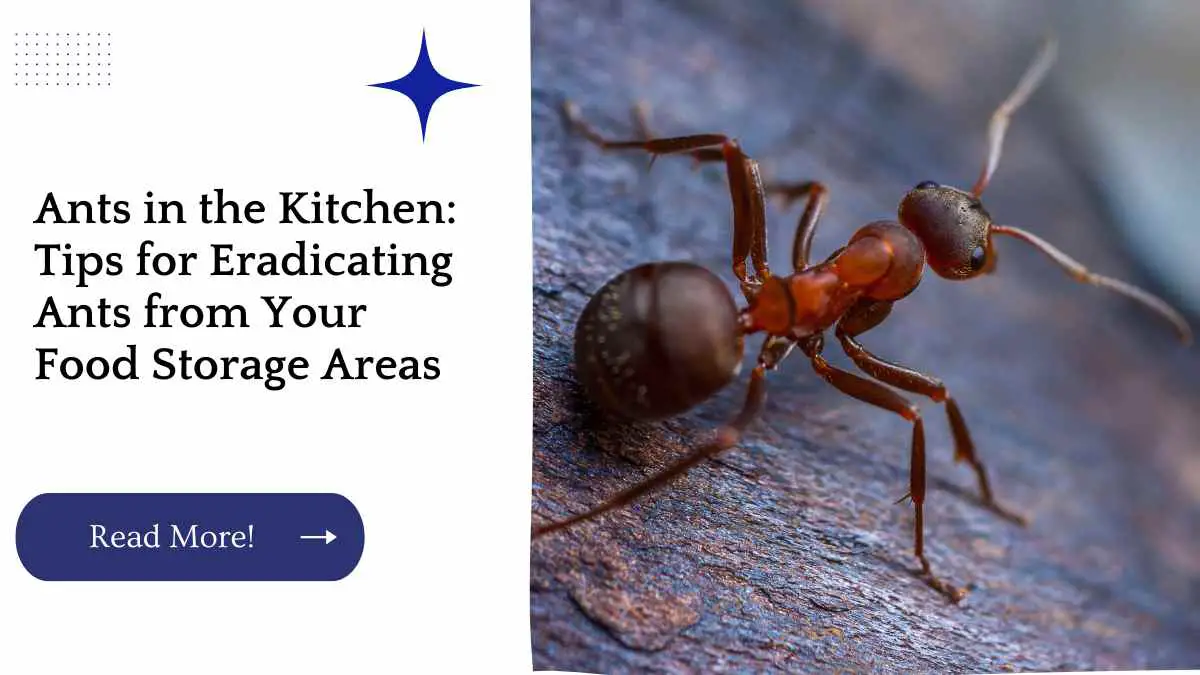Ants in the kitchen can be a major nuisance, and they can contaminate your food storage areas. This article provides a comprehensive guide on how to eradicate ants from your kitchen, using preventive measures, natural repellents, and chemical solutions. Let’s dive in!
| Takeaways |
|---|
| Ants in the kitchen can be a nuisance, but they can be prevented and eliminated using a variety of methods. |
| Pet-friendly ant control options are available that won’t harm furry friends. |
| Not all ants are harmful, and they play an important role in the ecosystem. |
| Managing ants in your garden can be done without harming the environment. |
| Natural remedies like vinegar, lemon juice, and peppermint oil can be used to keep ants away from your home. |
| Professional help may be necessary for severe ant infestations. |
Understanding the Ant Problem
2.1. Why Ants Are Attracted to Kitchens
Ants are attracted to kitchens because they provide an abundance of food sources and water. They are especially drawn to sweet and greasy substances, which can be found in many common kitchen items.
2.2. Common Types of Ants in Kitchens
Some common types of ants that may invade your kitchen include odorous house ants, pharaoh ants, and pavement ants. Each of these species has its own unique characteristics and behaviors, so it’s important to identify the type of ants you’re dealing with to effectively eliminate them.
If you’re a pet owner, eliminating ants from your home can be a challenge. To find out how to safely and effectively remove ants, check out our article on Pet-Friendly Ant Control, and learn how to protect your furry friends from harmful pesticides.
Preventive Measures
3.1. Maintaining Cleanliness
One of the most effective ways to prevent ants from invading your kitchen is to maintain a high level of cleanliness. This includes promptly wiping up spills, cleaning countertops and appliances, and sweeping or vacuuming regularly.
3.2. Sealing Entry Points
Seal any cracks, crevices, or gaps in your home’s exterior and around windows and doors that could serve as entry points for ants. This will help keep them from entering your kitchen in the first place.
3.3. Proper Food Storage
Store food in airtight containers and avoid leaving food out on countertops. This will help reduce the chances of ants finding a food source in your kitchen.
Mosquitoes are annoying and can pose a health risk due to their ability to transmit diseases. To avoid these pesky insects, it’s important to know how to keep them away. In our article on How to Keep Mosquitoes Away, we provide proven methods for repelling mosquitoes and enjoying your time outdoors without the hassle of bug bites.
Natural Ant Repellents
4.1. Vinegar
Mix equal parts water and white vinegar in a spray bottle and use it to clean surfaces where ants have been spotted. The strong scent of vinegar helps to repel ants and disrupt their scent trails.
4.2. Lemon Juice
Spray lemon juice around entry points and other areas where ants have been seen. The acidic nature of lemon juice can disrupt ant trails and deter them from returning.
4.3. Peppermint Oil
Dilute a few drops of peppermint essential oil in water and spray it around your kitchen. Ants dislike the strong smell of peppermint, and it can help keep them away.
4.4. Diatomaceous Earth
Sprinkle food-grade diatomaceous earth around the perimeter of your kitchen and near ant entry points. This natural powder is harmless to humans and pets but is deadly to ants when they come into contact with it.
Did you know that not all ants are pests? In fact, these incredible insects play an important role in the ecosystem. To learn more about the benefits of ants and how to differentiate between harmful and harmless species, you should read our post on The Role of Ants in the Ecosystem and discover the amazing world of ants.
| Repellent | Details |
|---|---|
| Vinegar | Mix equal parts white vinegar and water in a spray bottle, and apply around windows, doors, and other entry points to repel ants. |
| Lemon juice | Saturate a small piece of cloth with lemon juice and place it near ant trails to deter them from entering. |
| Cinnamon | Sprinkle cinnamon powder along ant trails or in strategic locations around your home to disrupt ants’ scent trails. |
| Peppermint oil | Mix 10-20 drops of peppermint oil with a cup of water in a spray bottle, and apply around windows, doors, and baseboards to deter ants. |
| Borax | Mix 3 parts borax with 1 part sugar and place the mixture in small containers near ant trails. Ants will carry the mixture back to their colony, killing them off. |
Chemical Solutions
5.1 Ant Baits
Ant baits are an effective chemical solution for controlling ant infestations. Place the bait stations near ant trails or areas where ants have been seen. The ants will carry the bait back to their colony, which will eventually kill the entire colony.
5.2. Insecticidal Sprays
Insecticidal sprays can be used to kill ants on contact. However, they should be used with caution, as they can be harmful to humans and pets if not used according to the instructions. Always read the label and follow the directions carefully.
Calling in the Professionals
If you’re unable to control the ant infestation on your own, consider calling in a professional pest control company. They have the experience, knowledge, and tools necessary to effectively eliminate ants from your kitchen.
Ants can be a nuisance when they invade garden spaces, but there are ways to manage their populations without harming the environment. To find out how to prevent ants from damaging your garden while preserving biodiversity, you should read our guide on Managing Ants in Your Garden and learn how to balance pest control with eco-friendliness.
Long-Term Ant Control Strategies
Implementing long-term ant control strategies will help ensure that your kitchen remains ant-free. These strategies include regular cleaning, proper food storage, and routine inspections for potential entry points.
| Strategy | Details |
|---|---|
| Keep your kitchen clean | Wipe down counters, sweep and mop floors, and store food in sealed containers to reduce the sources of attraction for ants. |
| Seal entryways | Seal cracks, gaps, and openings around doors, windows, pipes, and electrical wiring to reduce the access points for ants. |
| Use ant bait | Place ant bait stations in areas where ants are active. The ants will carry the bait back to their colony, killing off the entire colony over time. |
| Trim trees and shrubs | Ants can use trees and shrubs as a bridge to gain access to your home. Keep branches and shrubs trimmed back away from your home to limit access. |
| Call in a professional | If all else fails, consider calling in a professional pest control company for help. They can develop a custom plan to eliminate ants from your home and prevent future infestations. |
Conclusion
Ants in the kitchen can be a frustrating and unsanitary issue, but with the right combination of preventive measures, natural repellents, and chemical solutions, you can successfully eradicate them from your food storage areas. Don’t forget to implement long-term ant control strategies to keep your kitchen ant-free in the future.
Sand fleas can ruin a beach day by biting and causing irritation, but they can be challenging to eliminate. If you want to learn how to get rid of sand fleas and avoid their unpleasant bites, check out our post on How To Get Rid of Sand Fleas and discover some effective methods for preventing sand flea infestations.
Further Reading
If you’re interested in learning more about how to get rid of ants in your kitchen, check out these resources:
Allrecipes offers helpful tips and tricks for preventing and eliminating ants in your kitchen.
The Manual shares some natural remedies for dealing with ants, as well as tips for keeping them out of your food storage areas.
Bob Vila provides an overview of the different types of ants you might find in your kitchen, as well as suggestions for baits and traps.
FAQs
How do I know if I have an ant infestation in my kitchen?
You may be able to see ants in your kitchen, particularly around sources of food and water. Other signs include ant trails, small piles of dirt or debris, or the presence of ant colonies in nearby outdoor areas.
Why are ants attracted to my kitchen?
Ants are attracted to kitchens because they provide a source of food and water. Crumbs, spills, and open food containers can all attract ants to your kitchen.
How can I prevent ants from getting into my kitchen?
To prevent ants from getting into your kitchen, make sure to clean up any spills or crumbs right away, store food in sealed containers, and keep your kitchen clean and free of clutter. You can also use ant repellent products or natural remedies like vinegar and lemon juice to keep ants away.
What are some natural remedies for getting rid of ants in my kitchen?
To get rid of ants in your kitchen, you can use natural remedies like vinegar, lemon juice, cinnamon, or peppermint oil. These can be applied around windows, doorways, and other entry points to keep ants out.
When should I call a professional to deal with an ant infestation in my kitchen?
If you have tried to get rid of ants in your kitchen and they keep coming back or the infestation is particularly severe, it might be time to call in a professional exterminator. A professional can help identify the source of the infestation and provide treatment options that are safe and effective.

Hello! I’m Hellen James, and I write about how to keep pests from invading your home. For the last 10 years, I’ve been working in pest control and am excited to share my expertise with you!


